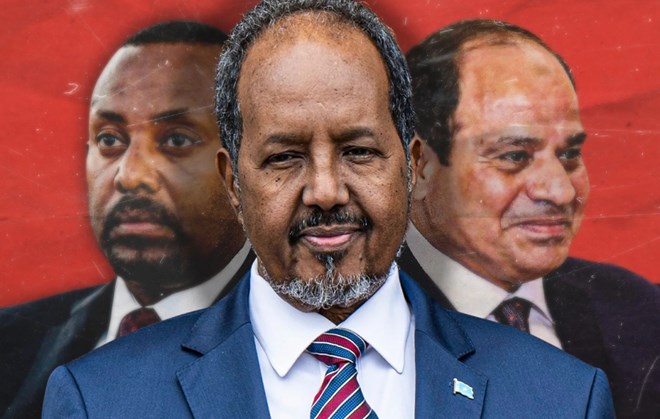
Tuesday September 24, 2024
Photo illustration by John Lyman
Abiy Ahmed, Ethiopia’s prime minister, issued a stark warning to potential aggressors: Anyone planning on invading this country should “think 10 times” before doing so. Meanwhile, Turkey and other neighboring nations are scrambling to mediate, with Djibouti even offering Ethiopia control over the critical Tadjoura port in a bid to reduce hostilities. Despite these efforts, the threat of a broader conflict looms ever larger.
A fractured history
Egypt and Ethiopia share a long, complicated history. As two of Africa’s first independent nations and founding members of the United Nations in 1945, their diplomatic ties stretch back decades. Yet, this shared history is riddled with fractures, exacerbated by Cold War dynamics and conflicting geopolitical allegiances.
advertisements
While Egypt aligned with the Soviet Union during the Camp David Accords, Ethiopia sided with Israel and the United States in the Arab-Israeli conflicts. At the heart of this rivalry lies the Nile River, an essential lifeline for both nations. Ethiopia’s control over one of the river’s primary tributaries—and its recent dam project—threatens Egypt’s water security, adding historical weight to the current crisis.The roots of Egypt’s fears run deep, dating back to the 1950s when Ethiopia first considered building a dam. Despite its capability, successive Ethiopian governments refrained from such projects, wary of provoking Egyptian retaliation. In the 1970s, Egypt threatened military action if Ethiopia moved forward. Even into the 21st century, the threat persisted, with former Egyptian President Hosni Mubarak reportedly stating that Egypt would be ready to fight any new dam construction on the Nile.
A military standoff in the making?
The situation has deteriorated further with the deployment of Egyptian troops to Somalia, a move widely perceived as a bid by Cairo to assert its dominance in a region where it has long clashed with Ethiopia’s interests.
At the core of this confrontation is the Grand Ethiopian Renaissance Dam (GERD), which Egypt views as a direct challenge to its share of the Nile waters. Cairo has issued warnings for years, insisting that any reduction in its Nile water supply would be intolerable. Now, with over 10,000 Egyptian troops in Somalia, it seems Egypt is prepared to back its rhetoric with force.
Ethiopia has expressed grave concern over Egypt’s military presence in Somalia, particularly as it edges closer to their shared borders. Although reactions among the neighboring communities vary, the deployment has sparked widespread criticism, especially in regions where suspicion of Egyptian motives runs high. While bracing for the worst, Ethiopia has so far adopted a cautious stance, emphasizing its readiness to defend its interests at any cost.
Diplomacy on the brink
Amid escalating tensions, Ethiopia has intensified its diplomatic outreach, particularly with Somaliland and Turkey. Turkey has emerged as a crucial player in the crisis, facilitating two rounds of indirect talks between Somalia and Ethiopia. However, concrete progress remains elusive. A third round of negotiations is scheduled for next month, but with the situation rapidly deteriorating, hopes for a peaceful resolution appear dim.
Djibouti, an important regional hub and long-standing ally of Ethiopia, has extended a potentially game-changing offer: granting Ethiopia full sovereignty over the Tadjoura port. This strategic asset would provide Ethiopia with an alternative to the contested Somaliland port, potentially easing some tension. Yet, whether this gesture will be seen as a timely intervention or a belated offer remains to be seen.
A region on the edge
The Horn of Africa is teetering on the brink of a full-scale regional war, with the potential to draw in other powers with vested interests. Turkey, Iran, and the Gulf States have stakes in the region, and their involvement could further complicate the conflict. Moreover, the presence of proxy groups like Somalia’s Al-Shabab insurgents or the Yemeni Houthis could ignite a broader, more chaotic war, escalating the human and economic toll.
The stakes could not be higher. If the crisis continues unchecked, it risks becoming one of Africa’s most volatile and dangerous flashpoints. The people of Somalia, Ethiopia, Egypt, and the broader Horn of Africa may face devastating consequences. The situation demands urgent, sustained diplomatic efforts from regional and international actors to prevent a descent into widespread violence and instability.